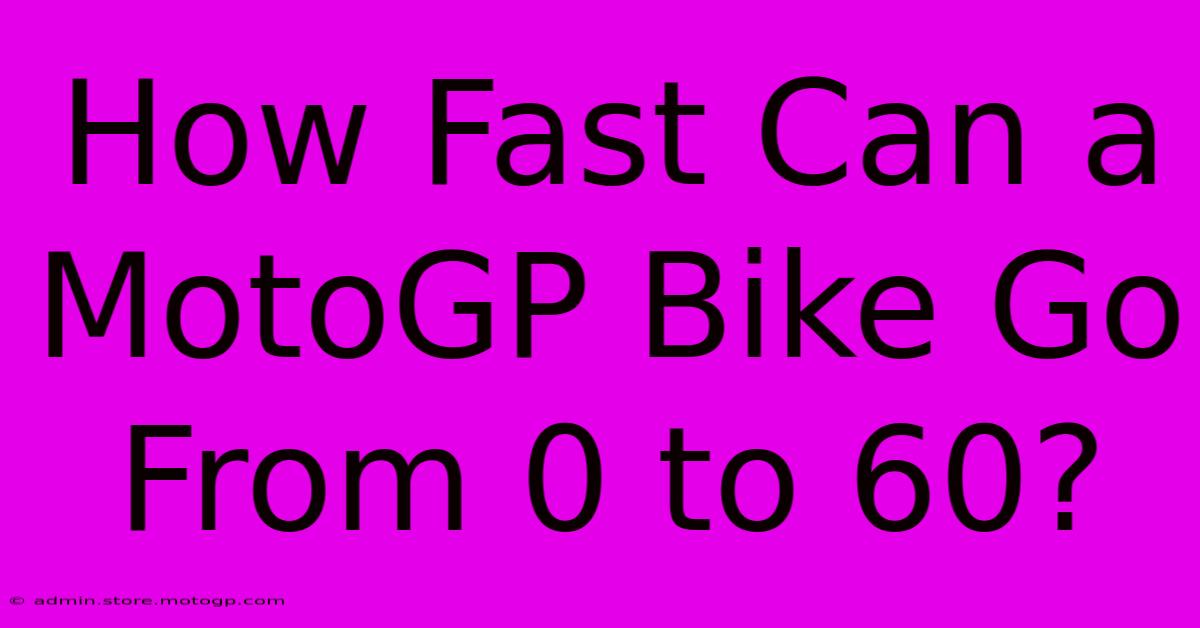How Fast Can A MotoGP Bike Go From 0 To 60?

Table of Contents
How Fast Can a MotoGP Bike Go From 0 to 60?
The roar of the engine, the blur of speed, the breathtaking lean—MotoGP bikes are the epitome of two-wheeled power. But just how quickly can these incredible machines accelerate from a standstill to 60 mph? Let's dive into the thrilling world of MotoGP acceleration.
Unrivaled Acceleration: MotoGP's Raw Power
Forget your everyday sports bikes; MotoGP machines are in a league of their own. Their incredible acceleration is a result of several factors working in perfect harmony:
-
Mind-blowing Horsepower: These bikes boast horsepower figures exceeding 260bhp, far surpassing even the most powerful street-legal motorcycles. This immense power is the fundamental driver of their blistering acceleration.
-
Lightweight Design: Every gram counts in MotoGP. The bikes are meticulously engineered to be as lightweight as possible, typically weighing under 360 lbs (163kg) – this low weight-to-power ratio is crucial for rapid acceleration.
-
Sophisticated Electronics: Modern MotoGP bikes utilize advanced electronics, including traction control, wheelie control, and launch control. These systems optimize power delivery, preventing wheelspin and ensuring maximum acceleration without losing control.
-
Exceptional Aerodynamics: The aerodynamic design of these bikes is crucial in minimizing drag at high speeds. While less impactful at lower speeds like 0-60 mph, the overall design contributes to the bike's overall performance.
0 to 60 mph: The Numbers
Pinpointing the exact 0-60 mph time for a MotoGP bike is challenging. Several factors influence this, including:
- Rider Skill: Even with identical machines, the skill of the rider significantly impacts acceleration. Expert riders can optimize launches and power delivery more effectively.
- Track Conditions: Tire grip, track surface, and even weather conditions affect traction and, consequently, acceleration times.
- Bike Setup: Slight adjustments in bike setup, such as suspension settings, can also influence performance.
Despite these variables, a general estimate for a MotoGP bike's 0-60 mph time is between 2 and 2.5 seconds. This is astonishingly fast, placing it among the quickest accelerating vehicles in the world.
Beyond 0-60: Top Speed and More
While the 0-60 mph figure is impressive, it only tells part of the story. MotoGP bikes reach incredibly high top speeds, often exceeding 200 mph (320 km/h) on certain tracks. This is achieved through a combination of powerful engines, aerodynamic design, and highly skilled riders pushing the limits.
Understanding the technology behind MotoGP acceleration is just as fascinating as witnessing the sheer speed. The combination of immense horsepower, lightweight construction, and sophisticated electronics creates a force of nature on two wheels.
Conclusion: The Apex of Acceleration
The sheer acceleration of a MotoGP bike is a testament to engineering excellence and rider skill. While the exact 0-60 mph time varies, the sub-3-second mark is a consistent indicator of their unmatched power and performance. These machines represent the pinnacle of motorcycle technology and continue to push the boundaries of speed and acceleration.

Thank you for visiting our website wich cover about How Fast Can A MotoGP Bike Go From 0 To 60?. We hope the information provided has been useful to you. Feel free to contact us if you have any questions or need further assistance. See you next time and dont miss to bookmark.
Featured Posts
-
Moto Gp Streams On A Budget Tips And Tricks
Feb 20, 2025
-
F1 Qualifying Todays Surprise Pole Sitter
Feb 20, 2025
-
Moto Gps Most Controversial Accidents
Feb 20, 2025
-
The Aero Phenomenon Understanding Its Impact
Feb 20, 2025
-
Yamaha Moto Gp The History In The Making
Feb 20, 2025
